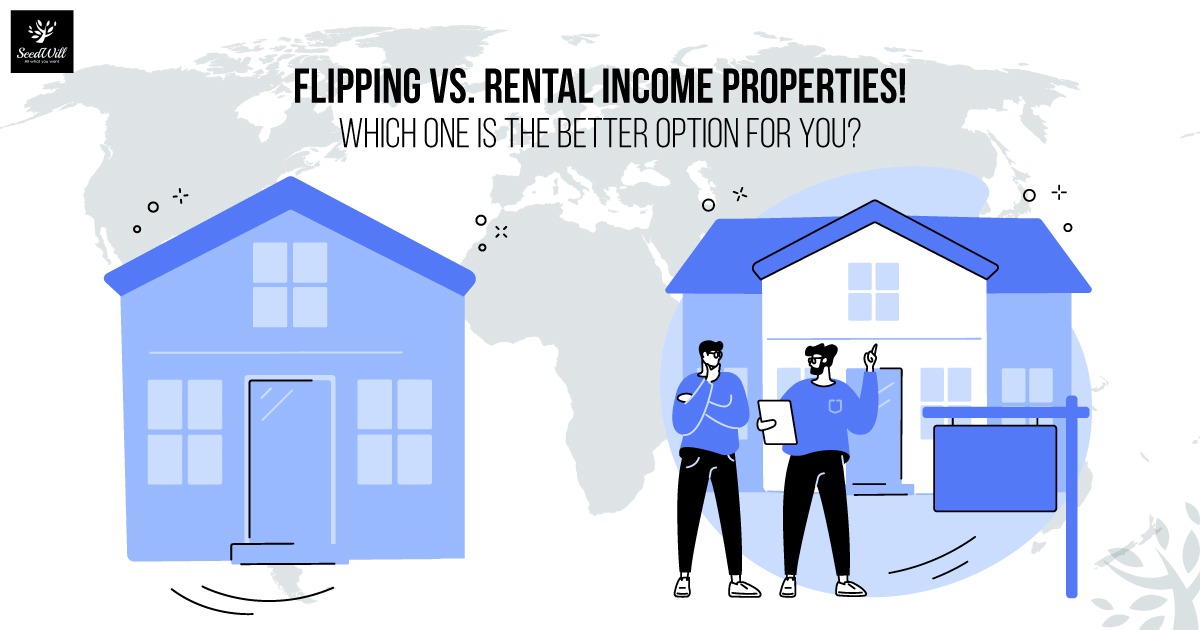
Flipping vs. Rental Income Properties! Which one is the better option for you?
Do you want to know whether flipping or buying and holding real estate is the best strategy for investing in property? If yes then the answer to this question is variable. Rather than choosing one method over the other, you should be a part of a clear strategic plan that satisfies all your goals. You must consider the opportunities presented by the existing market. Here is a brief of what is involved in pursuing each strategy and how to decide which one can be the best for you.
Why should you invest in Real Estate?
You must be aware of the fact that residential real estate ownership is gaining ever-increasing interest from retail investors. There are a lot of reasons for that:
- First of all real estate investment can provide more predictable returns than other investments like stocks and bonds.
- The next big thing is that real-estate provides an inflation hedge because rental rates and investment cash flow usually increase similar to the inflation rate.
- Real estate offers an excellent place for capital in times when you’re not so sure of the prospects for stocks and bonds.
- The profit generated in a real estate investment provides an excellent base for financing other investment options. Rather than borrowing to get the money to invest in other investment alternatives, investors prefer to borrow against their equity to finance other projects.
- The tax-deductibility of loan interest makes borrowing against a real-estate more attractive.
- Property investment provides a cash flow for owners but in addition to that, it can also be used for a home or other purposes.
Passive vs. Active Income
One major difference between buying and holding and flipping properties is that the buying and holding property can provide you a passive income, on the other hand flipping property offers active income to you.
Passive income is money that you earn every month from your investments no matter where you are. This income can be earned from stocks or owning rental property and getting rental income every month. You can hire a management firm to do all the required work like searching for the tenants, collecting rent, and taking care of maintenance work.
Now let us talk about the active income.
It’s the income that you earn. It is the salary that you get from working, as well as the money you make flipping houses. Flipping is considered an active source of income.
In this way, you can’t say that flipping is not simply an investment strategy like buying and holding stocks or property. So, if you’ve got a day job you must keep this thing in your mind that your free time is about to be taken up with all of the things that flipping a property demands.
Two Ways to Flip Properties
There are two different categories of properties that you can use in a buying/selling approach to real estate investing.
- Property (houses/apartments) that you can purchase below current market value because that is financial distress.
- The other one is the fixer-upper, a property with structural design, or condition issues that you can overcome to create value.
Investors who focus on distressed properties do so by figuring out the homeowners who can no longer manage their property or who are unable to sustain their properties. Sometimes they also find it by identifying the properties that are overleveraged and are on the verge of going to default.
However who prefer fixer-uppers generally renovates or enhances a property so that it looks more efficient for the apartment tenants.
It is true that continuously finding opportunities like this can be challenging in the long run. In simple words flipping properties should be considered more of a tactical strategy than a long-term investment plan.
The Pros and Cons of Flipping
Pros
- Faster return on your money
- Potentially safer investment
Cons
- Costs
- Taxes
Pro: Faster return on your money
One big advantage of flipping properties is getting the gains quickly. This thing releases capital for other purposes. Generally, the average time to flip a property is about six months, however, the first-timers should execute the process a little longer.
Pro: A potentially safer investment
Unlike other investment methods like the stock market, real estate markets are quite predictable. In other words, flipping properties is considered a safer investment strategy. The reason behind that it is intended to keep money at risk for a small amount of time. Flipping property doesn’t require the hassles of finding tenants, collecting rents, and maintaining a property.
Con: Costs
Flipping houses can generate the costs issues that you won’t face with long-term investments. There are various expenses involved in flipping. These can demand a lot of capital which can further lead to cash flow problems. Since transaction costs are very high while buying and selling sides, that can affect the profits significantly. If you are giving up your regular job and relying on flipping for your income, you’re giving up on a consistent income.
Con: Taxes
The frequent turnaround in properties can boost your taxes. That is true more specifically if things move too fast to take advantage of long-term capital gains. In those cases, you’ll have to pay a higher capital gains tax rate which will be based on your income if you own a property for less than a year.
The Pros and Cons of Buy-and-Hold the property
Pros
- Ongoing income
- Increase in property values
- Taxes
Cons
- Vacancy costs
- Management and legal issues
Pro: Ongoing income
Having rental property offers you a regular source of income, no matter where you are at that time. Regardless of decreasing prices, land values have almost always rebounded in the long term because of the limited supply of land.
Pro: Increase in Property Values
The longer you hold your property, the more you are going to be benefitted from inflation. Inflation will boost the property’s value however the amount you borrowed for the home loan goes down.
Pro: Taxes
Rental real estate is taxed as investment income, with lesser tax rates. You also have the leverage of writing down the expenses, that includes repairs, maintenance, or paying to the property manager.
Con: Vacancy Costs
Sometimes you might fail to find the tenants. It is one of the risks of owning rental property. It is true whether you do it yourself or hire somebody to do it for you. If your property remains empty for months, you are responsible for covering the EMIs of that time. Before investing in a buy-and-hold property, you must make sure that your budget covers at least three months of vacancy per year.
If you’re thinking to go for a buy-and-sell strategy, you should also determine whether you have the skill to handle distressed sale properties or fixer-uppers. Now you choose, what you want.



